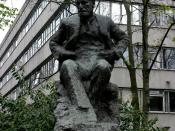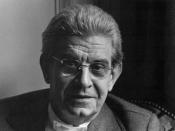1. Introduction This report will discuss the history of psychology and how its unique elements add to the social sciences. The four main psychological theories to be discussed below are: ? Psychoanalysis ? Behaviourism ? Humanistic Psychology ? Bio-psychology In order to stress the importance of psychology and its distinctive and intricate attributes, this report will attempt to reveal the essence of the discipline of psychology. In doing this, this report will answer: How does psychology?s mission add unique elements to the social sciences?? 2. Social Science Social science has a number of different factors and is made up of many different disciplines which include geography, anthropology, psychology, political science, economics and sociology. Although some of these disciplines have been researched and developed more thoroughly than others, psychology may be argued as being the most prominent. Psychology?s theories have been evolving for well over a century and are the subject of continuous debate in the academic world and beyond.
The key factor that differentiates psychology from the other five social sciences is its individual humanistic focus. The study of psychology is based upon the human condition (who am I? why am I?) whereas the other five disciplines are focused on humans as a group (who are we? why are we?). It is this factor that separates psychology from the other social sciences.
3. Psychological Theories Nathaniel Branden (2001, p. 5) states that ?psychology is the science that studies the attributes and characteristics which certain living organisms possess by virtue of being conscious?. Psychology stands alone as the one single social science to focus on individual actions and reactions whereas other social sciences focus their research on living organisms in a group. Many different theories have been developed over the years for psychology, four of which will be discussed below.
3.1 Psychoanalysis Little value was giving to the discoveries of early pioneers of this social science until in 1900, when Sigmund Freud developed the first theories of psychology. Freud?s most fascinating theory was psychoanalysis which was based on observations made in his private practice in Venice. David G. Myers (2002, p. 426) of Hope College in Michigan describes psychoanalysis as ?Freud?s theory of personality that attributes our thoughts and actions to unconscious motives and conflicts?. The techniques Freud used to treat patients with psychological disorders were sessions to expose and interpret unconscious tensions. Freud used these sessions to analyse the dreams that his patients had, believing that dreams were the ultimate road to the unconscious. Sigmund Freud was once quoted as saying ?I was the only worker in a new field? (quoted by Myers 2002, p. 426). Although only a very small percentage of current psychologists follow Freud?s theories and clinical methods, they continue to resonate in the popular mindset often laying the foundations for more recent theories.
3.2 Behaviourism Shortly after publication of Freud?s psychoanalysis theory, Russian biologist Ivan Pavlov began publishing accounts of his experiments on animals involving conditioned response which researched conduct that was motivated by a series of rewards and punishments. Inspired by Pavlov?s experiments, John B. Watson founded the move of behaviourism shortly after World War One. Many believe Watson?s theory was a reaction to Freud?s often controversial psychological theories. In any case, Behaviourism, like most psychological theories in the early years of discovery was thought to be a break-through in social science. Watson based his behaviouristic view of psychology on two factors. Psychology (1) should be an objective science that (2) studies behaviour without reference to mental processes. Most research psychologists today agree with (1) but not (2). ?Behaviourism satisfied a desire in the twentieth century for a psychological theory more observable and measurable than psychoanalysis? (Strada, 2003:178).
3.3 Humanistic Psychology In the 1960?s a third wave of psychological theory came into play. Humanistic psychology has many differing theories yet a majority of humanistic theories conceive of personality developing continuously over time. Psychologists of the humanistic revolution derived much of their inspiration from the humanities. In particular, Eric Erikson, who was influential in the humanistic movement. ?Erikson shows how personality matures through a number of challenges that arise at different stages of the life cycle? (Stevenson 2001, p.55). Much of the enthusiasm surrounding humanistic psychology was due to the lack of humanism found in earlier theories such as psychoanalysis and behaviourism. Humanistic theorists believed that past theories had overlooked a meaningful part of human experience: humanity?s need for love, self-esteem, belonging, self-expression, creativity and spirituality.
3.4 Bio-psychology As technology became increasingly stronger in the 1990?s, many psychologists turned their attention back to science. Now they had the ability to thoroughly research why our bodies accounted so much for who we are. This was a very different view from the humanistic psychologists who believed that the experiences people faced in life constantly shaped and moulded them. Biology became very sophisticated and research was undertaken to find out just how humans developed the way they did. Bio-psychology revolutionised psychology with biologically based rationales for behaviour and new therapies for treating patients.
4. Conclusion In conclusion, this report adds weight to the hypothesis that psychology?s mission to further develop the social sciences using the applied knowledge of how the human mind operates. Psychology enhances the study of geography, anthropology, political science, economics and sociology by understanding the unique elements of the mind and applying this knowledge to group behaviours. We are, to a certain extent, the product of our genetic and cultural influences and psychology allows us to explore the unseen recesses of the human mind. There are no real facts, just theories and thoughts about the mental processes that the human mind goes through. The study of psychology offers itself as the ultimate social science for the benefit of our society.
References Branden, N. 2001. The Psychology of Self-Esteem, 32nd Edition, USA, Jossey-Bass.
Myers, D. 2002. Exploring Psychology, 5th Edition, New York, Worth Pulishers.
Stevenson, A. 2001. Studying Psychology, Great Britain, Palgrave.
Strada, M. 2003. Through the Global Lens: An Introduction to the Social Sciences, 2nd Edition, Sydney, Prentice Hall.


